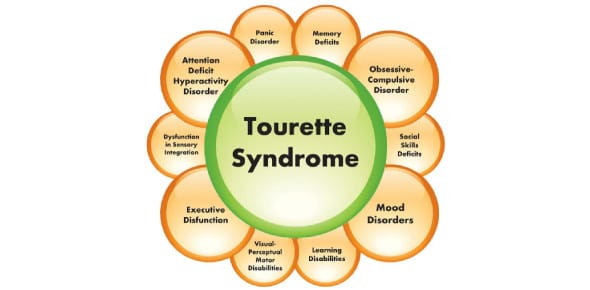Let’s dive into the fascinating world of Tourette’s syndrome, a neurological condition that affects more than just movements. It’s a world of quirks, surprises, and unique abilities. We’ll uncover the hidden talents, challenge stereotypes, and introduce you to the extraordinary individuals who live with Tourette’s. Get ready to expand your knowledge and gain a deeper understanding of this condition that extends beyond the tics.
Fun Facts About Tourette’s Syndrome
You’ve probably heard of Tourette’s Syndrome (TS), but how much do you really know about it? It’s often misunderstood, so let’s dive into some fascinating facts that might surprise you!
Celebrities You Know Live with TS
Did you know that soccer superstar David Beckham and legendary goalkeeper Tim Howard both have Tourette’s? They’ve been incredibly open about their experiences, helping to break down stigmas and show the world that TS doesn’t define you.
Tics Can Be Surprisingly Artistic!
When we think of tics, we often picture involuntary movements or sounds. But tics can get pretty creative! Some people with TS experience “echopraxia,” which means they might unconsciously mimic the movements of those around them. Others might have “echolalia,” where they repeat words or phrases they hear. It’s like their brain has a built-in remix button!
It’s Not All About Swearing
Movies and TV sometimes give the impression that everyone with TS uncontrollably blurts out swear words. In reality, this – known as coprolalia – is actually quite rare, affecting less than 1% of individuals with TS.
The Genetics of TS Are Tricky
While genetics definitely play a role in Tourette’s, it’s not as simple as inheriting a single gene. TS can skip generations entirely, and research suggests that multiple genes are likely involved. Scientists are still working to unravel the complexities of how TS is passed down.
Stress Can Turn Up the Volume on Tics
Just like stress can make us feel on edge, it can also exacerbate tics in people with TS. However, many individuals find that activities like exercise, listening to music, or engaging in hobbies they love can actually help manage their tics. It’s all about finding what works best for each person.
An Invisible Condition With Real Challenges
Tourette’s is often called an “invisible disability” because you can’t always tell someone has it just by looking at them. This can make it difficult for others to understand the challenges that come with TS, both physically and emotionally.
Tics Can Be Fickle
Imagine having a case of the hiccups that comes and goes! For many with TS, tics aren’t constant. Their severity can fluctuate throughout the day or week, and they might be more noticeable during times of stress or anxiety.
TS is a Spectrum, Not a Single Experience
Just like no two people are exactly alike, Tourette’s affects everyone differently. Some individuals might experience a few mild tics, while others have more complex symptoms. There’s no one-size-fits-all description of TS.
Tourette’s is Neurological, Not a Mental Illness
It’s important to understand that TS stems from differences in brain wiring, not from mental or emotional factors. People with Tourette’s are just as intelligent and capable as anyone else and can lead incredibly fulfilling lives.
Navigating Social Situations
Sadly, TS can sometimes lead to social difficulties, especially for kids and teens who might be bullied or teased because of their tics. This is why raising awareness and promoting understanding is crucial. When we educate ourselves and others, we create a more accepting and supportive world for those with TS.
What are Interesting Facts About Tourette’s?
So, we’ve talked about what Tourette’s Syndrome (TS) is, but what are some things you might not know about it? Let’s dive into some intriguing facts about this often misunderstood condition:
- Tourette’s is more common than you might think. You probably know someone with TS and don’t even realize it! It’s estimated that about 1 in every 100 kids and teenagers experience it. That means in a school of 1000 students, there’s a good chance 10 of them have Tourette’s.
- It’s not just about the tics. While those involuntary movements and sounds are a hallmark of TS, it’s much more complex than that. Many people with Tourette’s also face challenges with attention, behavior, and learning in traditional ways.
- Tourette’s is not a mental illness. There’s sometimes a misunderstanding that TS is psychological, but it’s actually a neurological condition. This means it affects the brain and how it communicates with the rest of the body, not someone’s mental state.
- You can’t catch Tourette’s. Just like you can’t catch someone’s eye color, this condition isn’t contagious. It’s not something you can get from being around someone who has it.
- There’s no magic cure for Tourette’s (yet!), but it can be managed. While there isn’t a one-size-fits-all solution, there are many ways to help people with TS reduce their tics and address other challenges they might be facing. This could include therapy, medication, or other strategies that work best for the individual.
Important Note: Research into Tourette’s Syndrome is ongoing. What we know about the condition is constantly evolving as scientists learn more. What’s considered “fact” today might be refined or expanded upon in the years to come.
How Did Tourette’s Get Its Name?
So, we’re talking about Tourette’s syndrome, and you might be curious about where that name came from. Well, like many medical conditions, it’s named after the person who first really brought it to the attention of the medical world.
Back in 1885, the prominent French neurologist, Jean-Martin Charcot, had an intern named Georges Gilles de la Tourette. Tourette was studying a group of nine patients who all had similar, unusual symptoms – things like involuntary movements and vocalizations, which we now know as tics. He meticulously documented his observations, calling it “convulsive tic disorder.”
Charcot was impressed with his intern’s work and, recognizing its significance, decided to give Tourette credit by naming the condition after him.
It’s interesting to consider how medical discoveries happen. Sometimes it’s a collaborative effort with various individuals playing crucial roles. And even though we call it “Tourette’s syndrome” today, both Tourette and Charcot were essential figures in its history.
What are the Facts About Tic Disorder?
We’ve talked a bit about Tourette Syndrome (TS), but let’s really dig into some fascinating facts that might surprise you. It’s more than just what you see on the surface.
Did you know…
- TS is more common than you might think. About 1 in every 100 kids experience tics, but not all of them actually have TS. It’s like a puzzle where tics are just one piece!
- Swearing isn’t a given. You’ve probably heard about people with TS blurting out words, maybe even swear words. This is called coprolalia. But here’s the thing: it only happens in a small number of cases. TS is way more diverse than that!
- Tics are like chameleons. They can change over time. What starts as one type of tic might become something else entirely, or maybe it happens more or less often. Life with TS can be full of surprises!
- TS often travels with companions. It’s not unusual for people with TS to also have other things going on, like ADHD, OCD, or anxiety. It’s like a package deal, which is why it’s so important to look at the whole picture when it comes to treatment.
- TS can be a hidden struggle. You can’t always tell someone has TS just by looking at them. It’s an “invisible disability,” which can make it tough for others to understand what it’s really like.
What are Billie Eilish’s Tourette’s?
Singer Billie Eilish has been open about her experiences with Tourette Syndrome. Now, let’s dive a bit deeper into what Tourette Syndrome actually is and how it can manifest.
Tourette Syndrome is a neurological condition – it affects the brain and how it communicates with the body. One of the biggest hallmarks of Tourette’s is having tics. Imagine these tics as sudden movements or sounds that someone makes involuntarily, kind of like a hiccup you can’t control.
These tics can vary a lot from person to person. Some people might blink their eyes rapidly or jerk their head, while others might make clicking noises or repeat words unintentionally. It’s important to remember that these tics aren’t something someone can just “stop” doing – they’re not a choice.
Scientists believe that Tourette Syndrome likely stems from a complex interplay of genetic and environmental factors. This means that it might run in families, but it’s not as simple as inheriting a single gene. Environmental factors during a person’s development could also play a role, but there’s still a lot researchers are working to understand.
Now, you might be wondering: what’s it like to live with Tourette Syndrome? Well, the experience can differ significantly from one person to the next. Some individuals might have very mild tics that are barely noticeable, while others might experience more pronounced tics that impact their daily routines. The good news is that there are ways to manage the symptoms of Tourette Syndrome.
Medication can sometimes help to reduce the frequency and intensity of tics. Therapy can also be incredibly beneficial, providing individuals with coping mechanisms and strategies to navigate the challenges that Tourette’s might present.
It’s crucial to remember that Tourette Syndrome doesn’t define a person. People with Tourette’s are just like everyone else, with their own unique talents, personalities, and dreams. Billie Eilish’s openness about her experiences helps to destigmatize the condition and show the world that people with Tourette’s can achieve incredible things.
Can People with Tourette’s Cuss?
It’s a common question, but the answer is more nuanced than a simple yes or no.
Tourette Syndrome, or TS for short, is all about tics. Imagine your brain sending a random signal to your body, making you blurt out a word, twitch your nose, or maybe even clap your hands. That’s a tic, and it happens out of the blue.
The kind of tic everyone wonders about is called coprolalia – the uncontrollable urge to shout out a swear word. It’s what most people picture when they hear “Tourette’s,” but here’s the catch – it’s actually pretty rare. Less than 10% of people with TS experience coprolalia. That means the vast majority have other types of tics.
Think of it like this: TS is like a mixed bag of Skittles. You’ve got your red ones, your green ones, your purple ones – all different flavors and colors. Coprolalia is just one of those Skittles in the bag, and it doesn’t show up for everyone.
So, yes, some folks with TS do swear involuntarily, but it’s not a given. There’s a whole lot more to this condition than just that one symptom, and it’s important to remember that everyone experiences it differently.
What Can Tourette’s Lead To?
So, we’ve talked about the tics—those sudden movements or sounds that folks with Tourette’s Syndrome (TS) just can’t help but do. But here’s the thing: Tourette’s doesn’t always stop there. It can sometimes bring along some extra challenges that go beyond those noticeable tics.
Feeling Anxious or Down: Imagine having these tics popping up unexpectedly; it’s understandable that people with TS might experience more anxiety or even feel a bit down sometimes. This can be due to the social stigma surrounding tics or the feeling of being different, which can be tough to deal with.
School Daze and Social Circles: School can be a real rollercoaster for anyone, but for kids with TS, it can sometimes feel like an even bumpier ride. Those tics might make it hard to focus in class or might accidentally disrupt things, which can lead to some uncomfortable moments. Plus, let’s be real, kids can be tough on each other, and some might not understand what TS is all about, leading to teasing or bullying. This can make it harder to make friends and feel like you belong.
Teammates in the Brain: When Other Challenges Join the Mix: Here’s an interesting twist: sometimes, TS doesn’t show up alone. It’s like having another guest at the party—one you weren’t exactly expecting. Conditions like ADHD (Attention Deficit Hyperactivity Disorder) or ASD (Autism Spectrum Disorder) can sometimes hang out with TS, making things a bit more complex. This can impact how someone learns, interacts with others, and manages their emotions.
Life After School: Jobs and Hobbies: Now, let’s fast forward to adulthood. For some people with TS, those tics might make certain jobs a bit tricky, especially ones that require super precise movements or lots of talking. But hey, that doesn’t mean a fulfilling career is out of reach! It just means finding the right fit and advocating for any support needed. And when it comes to hobbies and having fun, well, those tics shouldn’t stop anyone from pursuing their passions!
The Big Picture: The thing is, Tourette’s can be a bit unpredictable. Some folks might only have mild tics that don’t cause too much trouble, while others might have more frequent or noticeable ones that impact their daily life. The good news is that researchers are working hard to learn more about TS and find ways to better support those who have it.
Where to Learn More: If you’re curious about Tourette’s and want to dive deeper, the Tourette Association of America is a great place to start. They have tons of reliable info and resources available. Remember, knowledge is power!
Are Tik Tok Tourette’s Real?
So, we’ve all seen those TikTok videos, right? The ones where people are ticking and twitching, and it seems like everyone’s suddenly talking about Tourette’s Syndrome. It’s got a lot of people wondering – are these Tik Tok Tourette’s a real thing?
Here’s the deal: Tourette Syndrome (TS) is a genuine neurological condition. It causes people to make involuntary movements and sounds, which are called tics. This means they can’t help it; their brain is sending these signals that make their body move or make sounds without them wanting to.
Now, while some folks on TikTok might genuinely have TS, there’s something else going on here, too. Doctors and scientists have noticed a rise in something called “psychogenic tics,” especially among teenagers, and particularly girls, who’ve been spending a lot of time on TikTok.
Think of psychogenic tics like this: imagine you’re really stressed out, and you start biting your nails. You might not even realize you’re doing it, and you’re doing it because of how you’re feeling, not because of something physically wrong with your nails. Psychogenic tics are kind of like that. They’re real tics, but they’re driven by psychological factors – things like stress, anxiety, or even just seeing other people tic and unconsciously mimicking it.
Social media, especially a platform like TikTok where videos are short and attention-grabbing, can make certain behaviors seem more common or even “cool.” This doesn’t mean anyone is faking it, but it does mean that seeing these behaviors repeatedly can influence how our brains react and potentially lead to those prone to psychogenic tics to develop them.
The big takeaway here is that it’s complicated. Yes, TS is a real neurological disorder. But TikTok might be playing a role in triggering tic-like behaviors in some people who are more susceptible to them for psychological reasons. It’s essential to be understanding and remember that everyone’s experience is unique. If you’re concerned about yourself or someone you know, talking to a doctor or therapist is always a good idea. They can help figure out what’s going on and how to manage it.
And hey, let’s all try to be a little more mindful of what we watch and share online. You never know how it might affect someone else.
Do People with Tourette’s Feel It?
We’ve been talking about Tourette Syndrome (TS), a condition that leads to involuntary movements and sounds called tics. But what’s it actually like to have Tourette’s? Do people feel those tics coming on?
The short answer is yes. Imagine having an itch you absolutely have to scratch – that’s a bit how a tic can feel. It’s not quite the same for everyone, and some describe it more as a build-up of tension that gets released with the tic.
Either way, these tics can be super uncomfortable, even painful at times. Plus, there’s often embarrassment, especially if the tics involve movements or sounds that are disruptive or draw attention.
Think about it: dealing with a sneeze you can’t hold back is one thing, but imagine having that kind of urge many times throughout the day, with different tics popping up. It can make everyday things – school, work, just hanging out – really challenging.
It’s worth noting that research is still ongoing, and how people experience their tics can vary a lot. There’s no one-size-fits-all answer, just like with any other health condition. Some folks might have a stronger urge or sensation before a tic, while others might describe it differently.
The important thing to remember is that people with Tourette’s are not choosing to tic; it’s something their body does involuntarily. Understanding that can go a long way in reducing stigma and showing empathy for those living with TS.
Do People with Tourette’s Sleep?
We’ve been talking about Tourette’s syndrome and its quirks, but let’s talk about something we all relate to: sleep! You might be surprised to know that sleep and Tourette’s have a bit of a complicated relationship. It’s not always easy to get a good night’s rest when you’re living with Tourette’s. Actually, a lot of people with Tourette’s – maybe even up to 80% – have trouble sleeping. We’re talking about things like tossing and turning all night, having a hard time falling asleep in the first place, or even waking up feeling like they haven’t slept a wink.
So, what’s the deal with Tourette’s and sleep? Well, scientists are still trying to figure out exactly why these two seem to clash. It’s likely a bunch of different things at play.
For instance, some scientists think there might be something going on in the brain – specifically in the areas that control sleep. Imagine a little miscommunication happening in those areas, making it tough for the brain to switch into sleep mode.
On the other hand, some researchers point out that lots of folks with Tourette’s also deal with other things like ADHD or anxiety, which are known sleep disrupters in their own right. Think of it like this: if you’re already feeling anxious or your brain is in overdrive, it’s going to be a lot harder to wind down and drift off peacefully.
While the “why” is still a bit of a mystery, one thing is clear: Difficulty sleeping can really take a toll on someone with Tourette’s. It’s not just about feeling tired, although that’s a big part of it. Poor sleep can make tics more intense for some people, and it can also make it harder to focus, learn, and manage emotions during the day. It’s a bit of a vicious cycle – Tourette’s can mess with sleep, and lack of sleep can make Tourette’s symptoms feel even more intense.
The good news is that researchers are constantly digging deeper into this connection, trying to understand those sleep disturbances and find ways to help people with Tourette’s get the restful sleep they deserve.
How Many Tourette’s are There?
So, we’ve talked about what Tourette’s syndrome (TS) is, but you might be wondering just how common it is. Well, TS might be more prevalent than you think.
Experts believe that about one out of every hundred kids experiences some degree of TS. That’s like having one kid in every average-sized classroom! And while it can affect anyone, boys seem to be a bit more prone to it than girls.
Now, nailing down the exact “why” behind TS is a bit tricky. It’s like a puzzle where both our genes and the world around us play a part. Think of it this way: you might have a predisposition to something in your genes, but whether that something actually develops can be influenced by your environment. The same goes for TS.
The important thing to remember is that even though there isn’t a magic cure for TS, there are ways to manage the symptoms and live a full and happy life. And scientists are constantly learning more about TS, so who knows what the future holds?
Did you know that there’s more to pomegranates than meets the eye? Explore fun facts about pomegranates that will make you appreciate this superfood even more.
Who would have thought that termites could be so fascinating? Dive into the fun facts about termites and discover their surprising world.
- Unveiling the Enigma: Mansoureh Khojasteh Bagherzadeh’s Public Appearances & Private Life in Iran - July 18, 2025
- Unveiling the Mystery: Mansoureh Khojasteh Bagherzadeh’s Husband: A Rare Glimpse into a Private Life - July 18, 2025
- Unveiling Masoud Khamenei’s Mother: Power, Influence, and Iran’s Future - July 18, 2025
















